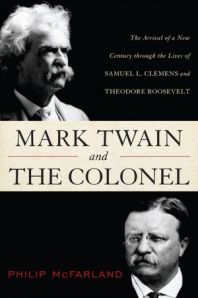Posts Tagged ‘Theodore Roosevelt’
Mark Twain and the Colonel: Samuel L. Clemens, Theodore Roosevelt, and the Arrival of a New Century, by Philip McFarland
Samuel Clemens, better known as Mark Twain, and Theodore Roosevelt were two of the most famous men in America at the turn of the century, but had little in common besides an intense mutual dislike of each other. Where Roosevelt was a beloved leader, Twain had his finger on the country’s cultural pulse and was a sort of pre-pop icon. Twain was immensely famous in his own lifetime, and traveled in many of the same circles as did the president. Though they only met briefly a few times, they were each highly aware of the other’s career and looked upon each other with disdain. Mark Twain may have been known as a writer and humorist, but much of his work was politically engaged and often critical of Roosevelt’s administration in particular. In fact, Twain once went so far as to write that Theodore Roosevelt was “far and away the worst president we have ever had”. Roosevelt, in turn, found Twain so irritating and meddlesome that he was once said to have dreamt aloud of skinning Mark Twain alive.
Twain and Roosevelt were representative of two different facets of American masculinity in an era wrought with change due to industrialization, urbanization, and imperialism, the last of which became the most hotly contested issue between the two men when Roosevelt lead America in occupation of the Philippines. Twain had written the blueprint for American boyhood with his stories about the boisterous Tom Sawyer and Huck Finn, reflecting a folksy Americana and drawing from his own childhood despite his relatively privileged upbringing. Roosevelt, an east coast War Hero, was known for restraint, discipline, and a love of hunting, which Twain found grotesque. If my post so far seems to center Twain’s reactions to Roosevelt’s policies, that’s because McFarland himself seems to favor Twain and rely on these reactions for marking narrative transitions.
The first real problem I had with this book is that all physical and otherwise direct interaction between the men was so few and far between that a joint biography makes little sense. Had the framing been skewed to focus more on the ways in each man was symbolic of a different set of American values at a particular time (which it did, only not enough) instead of constructing an active rivalry from little more than a couple heated opinions on the part of each man, perhaps the tie that binds the two biographies would not have been so weak.
This would not, unfortunately, do away with the problem of organization. The book moves thematically rather than chronologically, which might work better were it not so repetitive. To come to the point of the death of Twain’s daughter or Roosevelt’s marriage multiple times following the tellings of different events was perhaps meant to emphasize the importance of those events in multiple contexts, but instead confused me entirely about where I was in each man’s life story and also bored me.
McFarland is a perfectly capable historian whose passion is evident in his writing, but while the relationships both personal and impersonal between Twain and Roosevelt is tempting material, it appears a thin foundation for such a lengthy and ambitious work.
A copy of Mark Twain and the Colonel was kindly sent to me by the folks at Newman Communications on behalf of Rowman and Littlefield Publishers.
